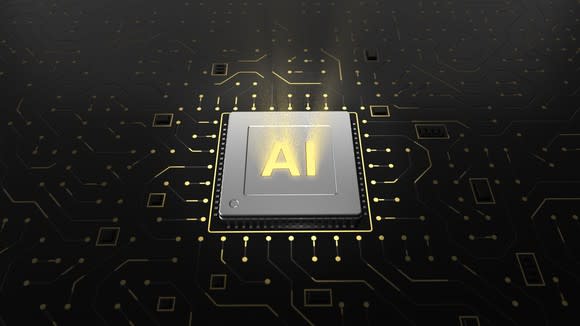3 Best Artificial Intelligence Stocks to Buy Now
The artificial intelligence (AI) revolution has arrived!
Research into AI -- the capability of a machine to mimic intelligent human behavior -- officially began in 1956. Practical applications, however, have been very limited until recent years. Advances in computing power, large amounts of data, affordable cloud-computing storage, and fast network connections are largely attributed as the factors that have enabled AI to come of age.
AI is in the early innings of revolutionizing nearly every industry from the consumer internet and transportation to healthcare and manufacturing. In 2017, the global AI market was forecast to grow 175% from 2016, to $2.4 billion, according to Statista, which also projects it to increase a whopping tenfold between 2017 and 2022.
There are two main ways to play this massive trend. You can invest in companies that are primarily making AI chips and other components for use by customers in "smartening" up machines of all types, with NVIDIA (NASDAQ: NVDA) falling into this category. You can also bet on companies that are poised to benefit from using AI to improve their products and services. All the other companies listed in the below chart -- along with companies that make robots -- are in this category.

Image source: Getty Images.
Here's an overview of many of the top players in the artificial intelligence space and their stocks.
Company | Market Cap | P/E (TTM) | 5-Year Estimated Average Annual EPS Growth Rate | 1-Year Return | 5-Year Return |
|---|---|---|---|---|---|
Alphabet* (NASDAQ: GOOGL)(NASDAQ: GOOG) | $824 billion/$816 billion | 39.7/39.3 | 20.9% | 43.9%/46.3% | 215%/N/A |
NVIDIA | $150 billion | 61.4 | 15.5% | 125% | 2,050% |
Amazon.com | $683 billion | 360 | 20.4% | 70.7% | 420% |
IBM | $154 billion | 27.3 | 2.9% | (1.6%) | (4.9%) |
Microsoft | $724 billion | 31.8 | 10.7% | 47.3% | 285% |
$540 billion | 36 | 29.9% | 42% | 495% | |
Apple | $854 billion | 18.3 | 11.2% | 40.3% | 185% |
S&P 500 | -- | -- | 27.6% | 111% |
Data sources: YCharts and Yahoo!Finance. TTM = trailing 12 months. EPS = earnings per share. *Google Class A shares (GOOGL) have superior voting rights to Class C (GOOG) shares. As of this writing, only IBM has reported its Q4 results. Data as of Jan. 29, 2018.
All these companies are diving headfirst into AI, particularly a type of machine learning called deep learning, which essentially trains a machine to make inferences from data like we humans do. However, some of them are ahead of the pack. In terms of AI patents, while IBM remains the champ, Google and Microsoft have been turning in great showings in recent years. When it comes to ramping up hiring of AI talent in the United States, Amazon and NVIDIA rank as Nos. 1 and 2, respectively, based on a Glassdoor.com analysis in October. These stats support my opinion that investors who want a stock that has solid exposure to AI and top growth potential should focus on the stocks discussed below.
Alphabet: The first-mover in using AI among the big techs
Alphabet's Google is arguably the first mover in using AI among its "big tech" peers -- a category from which I'm excluding IBM, which arrived early to the AI party. The company has been pouring massive sums of money into infusing AI -- particularly machine learning -- into its products and services. For instance, in its core search business, Google uses AI to improve the relevancy of the ads it shows users, and on YouTube, it employs AI to serve up music and video selections based on a users' previous listening and viewing habits. Like Amazon and Apple, the company also has an AI-powered smart assistant: Google Assistant started out its life helping Android-powered smartphone users, and is also now incorporated into the company's smart speaker, Google Home.
Moreover, Google has developed its own AI chip. In May 2017, it announced the second generation of its Tensor Processing Unit (TPU), designed to run its deep-learning algorithms. Its first-gen TPU only performed inferencing, whereas the new chip can also handle training. Google is using these chips for internal purposes, and plans to make them available for others to use via Google Cloud, just as it makes available other chips, including NVIDIA's graphics processing units (GPUs). Cloud AI services include such things as image recognition and language translation.
Wall Street expects Alphabet to grow earnings at an average annual rate of 20.9% over the next five years. The company has slightly to moderately beat the consensus estimate in the first three quarters of this year, suggesting that analysts might be underestimating its growth potential. Moreover, a big hit product from one of its moonshots -- such as in the self-driving vehicle space -- could drive greater-than-expected growth.

Image source: Getty Images.
NVIDIA: Leading supplier of AI chips and AI-powered platforms for driverless vehicles and more
In recent years, NVIDIA has transformed itself from being largely a maker of GPUs for computer gaming and professional visualization applications to a company that's also at the forefront of AI. Its GPU-based approach to deep learning is being rapidly adopted by enterprise companies -- including all the major internet companies and cloud-service providers -- for use in their data centers, and by automakers and others for use in their driverless vehicle initiatives.
This transformation has revved up NVIDIA's revenue and earnings growth, which in turned has powered its stock to fantastic returns. NVIDIA's riding high, though a slew of competitors are aiming to knock it off its AI pedestal. Several companies have or are working on competing approaches to AI, while chip giant Intel plans to soon enter NVIDIA's turf, discrete GPUs. While NVIDIA has a big lead, Chipzilla can't be underestimated, particularly since it has gobs of money.
Wall Street expects NVIDIA's growth engine to slow considerably. Analysts project that the chipmaker will post annual earnings growth of 63.8% this year when it reports Q4 and full-year results on Feb. 8, and then just 20.9%, on average, over the next five years. That said, NVIDIA has a history of breezing by Wall Street's estimates, so there's good reason to believe the company's earnings will grow faster than analysts' project.
Amazon: Making a huge recent push into AI
Like Alphabet, Amazon uses AI for internal purposes to improve its products and services, and has AI applications available for use by customers of its Amazon Web Services (AWS) cloud-computing business. In its core e-commerce business, which accounts for the bulk of its revenue, it uses machine learning for applications ranging from generating product search rankings to producing product recommendations based on customers' previous purchasing and viewing habits. Given Amazon is entirely dependent on AWS for its profits, it's not surprising that late last year the company greatly ramped up the AI applications it has available in the cloud, as it wants to maintain its leadership position in the lucrative public cloud space.
AI has also helped Amazon take an early lead in the race to own the "smart home." Amazon's AI-powered smart assistant, Alexa, has helped propel Amazon's Echo to the leading position in smart home speakers, leaving Google, Apple, and others scrambling to play catch up to the first-mover in this space.
Wall Street expects Amazon to grow earnings at an average annual rate of 20.4% over the next five years. The company crushed earnings' estimates in two of the last three quarters, so there's reason to believe it could grow faster than forecast. That said, CEO Jeff Bezos still operates Amazon as a start-up in some ways, with his main goal not being to increase earnings, but to grow cash flow, which he plows back into expanding the company's empire. So Amazon isn't a stock for investors who want to see steady earnings growth or non-sky-high stock valuations based on earnings, but a stock for those who are in sync with Bezos' long-term vision.
More From The Motley Fool
John Mackey, CEO of Whole Foods Market, an Amazon subsidiary, is a member of The Motley Fool's board of directors. Suzanne Frey, an executive at Alphabet, is a member of The Motley Fool's board of directors. Beth McKenna has no position in any of the stocks mentioned. The Motley Fool owns shares of and recommends Alphabet (A shares), Alphabet (C shares), Amazon, Apple, Facebook, and Nvidia. The Motley Fool has the following options: long January 2020 $150 calls on Apple and short January 2020 $155 calls on Apple. The Motley Fool recommends Intel. The Motley Fool has a disclosure policy.

 Yahoo Finance
Yahoo Finance 